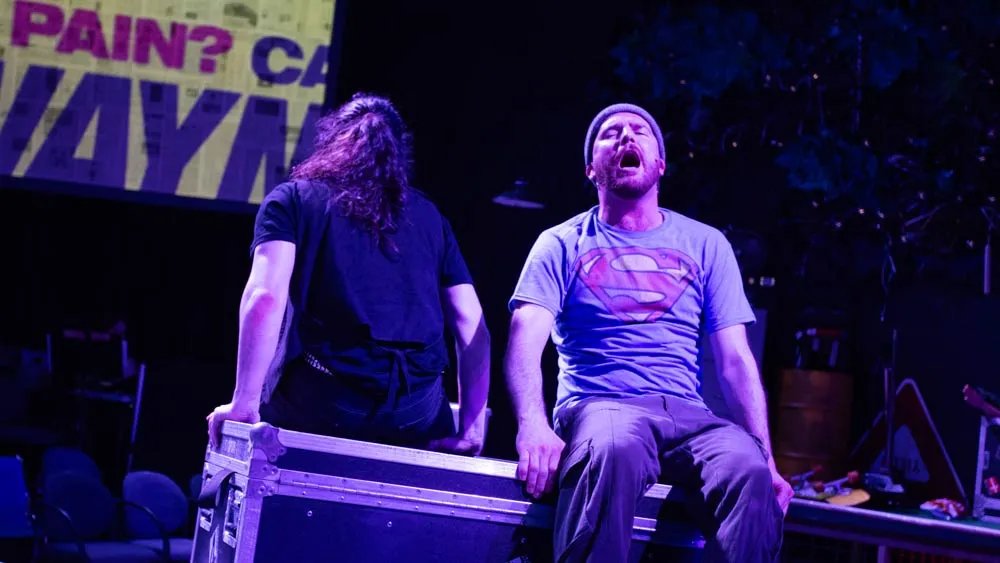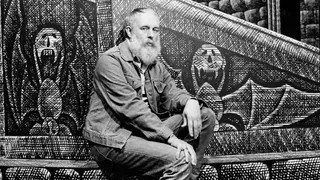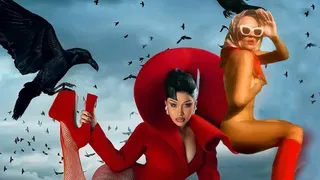January 3, 2007
Author Armistead Maupin on "The Night Listener"
Robert Nesti READ TIME: 10 MIN.
There is always been something playful about Armistead Maupin, so much so that many have speculated that even his name is a pseudonym - an anagram for the phrase "the man I dreampt up." That, as it turns out, was merely something of an urban myth about the San Francisco based author who was actually named for his father, a lawyer from Raleigh, North Carolina who died last year.
But it is easy to understand why such an anecdote came to pass as truth: teasing his readers has long been one of the characteristics that defines his work, most notably his six-book series collectively called Tales of the City that follows the lives of a group of San Franciscans from the height of the sexual revolution through the advent of AIDS. It was, though, necessity that dictated this technique: the stories originated as a column in the San Francisco Chronicle as an ongoing series, and it was necessary for him to leave his readers intrigued enough to return to read his column again.
He needn't have worried: the columns became books, and the books became a celebrated mini-series (both on PBS and Showtime) that helped launch the career of Laura Linney as Mary Ann Singleton, a na?ve 20-something from Cleveland who emigrates to San Francisco and finds herself living at 28 Barbary Lane, the magical boarding house run by the mysterious Anna Madrigal. Maupin successfully wrote a social history of the adoptive city he loved, but also an old-fashioned page-turner, one that recalled his great influence, film director Alfred Hitchcock.
Hitchcock comes to mind again with The Night Listener, his novel that was published six years ago and comes to DVD on January 9, directed by Patrick Stettner with a screenplay by Maupin and his former partner Terry Anderson. His story, loosely based on real events, follows what happens when popular (and out) talk show host Gabriel Noone (Robin Williams) is befriended by a young teenager named Pete, (Rory Culkin,) and his adopted mother (Toni Collette.) Noone's personal life is in flux, and he finds himself more-and-more involved with the teen, who considers himself Noone's biggest fan. When questions arise as to the Pete's identity, Noone becomes obsessed with discovering the truth.
Maupin based the book on his experiences with Anthony Godby Johnson, the author of the autobiography A Rock and a Hard Place: One Boy's Triumphant Story. "That was in 1993," the writer explained from his San Francisco home recently." The book came with a forward by my friend Paul Monette, a wonderful gay writer from LA (who died in 1995,) and an afterward from Mister Rogers, Fred Rogers himself; so I had very little reason to doubt the credentials of the work."
In the book Johnson told a harrowing story of being raped and sexually abused as child, and learning he had AIDS at age 11. Maupin was asked to write a blurb for the book, which he did; and then watched as Johnson's identity unraveled. A Newsweek investigation discovered that no one, except Johnson's adoptive mother Vicki Johnson (actually Vicki Fraginals Zackheim,) had ever seen the boy in person. Further investigations (including one that was broadcast just last week on 20/20) concluded that the boy's voice was actually that of Zackheim's. Maupin admits being duped, but was not terribly distressed when he found out the truth.
"To be perfectly honest, I thought, 'wow, what a great story this would make.' I was much more fascinated by it than angered by it. It's been conclusively proved that Vicki Fraginals Zackheim, the so-called adoptive mother of the boy, wrote the book. 20/20 had an expose of the story last week that revealed that voice prints of her and the boy matched up."
He admits being initially duped, but had his doubts some time after beginning a relationship with the person he thought was Johnson. "It was about six months into the phone friendship when Terry spoke with the adoptive mother for the first time and he noticed the similarity between the two voices. I had noticed this myself when on one occasion I had mistaken her for him, and she said, 'Don't let him hear that. He always hates to be mistaken for his Mom.' So I always made a point of listening very carefully to make sure I was talking to the right one. What she was doing was altering her voice in such a way as to make it sound like a 14-year old boy. She was a wonderful mimic - when she was playing the boy on several occasions she was also mimicking actress Rosie Perez. She was quite adept at what she could do."
"It's funny," he continued, "once you know something is a lie, it's easy to see the kitsch contained therein. But I was extremely moved by the notion of this 14-year old boy dying of AIDS who was straight-identified, but was extremely sympathetic to gay people. I was extremely vulnerable at the time because my closest friend was very close to death because of AIDS, and my partner at the time, Terry, looked like he was about to go himself. So it was extremely easy to take it in. I should have had some suspicions, though, it's a little overblown. Looking back on it, I'm surprised I wasn't a little suspicious about a child who rescued a kitten on Christmas Eve. It gets a little florid in its Dickensian language."
Maupin also acknowledges the strong similarities between the Johnson case and those of James Frey (A Million Little Pieces) and, most significantly, J.T. Leroy, the writer whose autobiographical stories claimed he was a homeless, transgendered, HIV positive victim of child abuse who turned to drugs and prostitution to survive. Leroy was exposed late last year by the New York Times as being the creation of writer Laura Albert. "I felt as if I had been there and done that when I heard of the Frey and Leroy controversies. In fact the basic description of J.T. Leroy is almost identical to Anthony Godby Johnson: a kid with AIDS who was abused by his mother and forced into a life of prostitution, and had been rescued by a social worker."
What does he think motivates someone to fabricate a story and pass it off as fact?
There may be a few that are driven solely by money, but I think it's bigger thing than that. I think it's a kind-of pathology that is far more widespread than is known. Thanks to cell phones and the Internet, it is far easier today to be someone than you're not, and a lot of people are tempted to try on a new personality because they don't much care for themselves.
He admits that the novel was his most autobiographical to date. "It is still fictional to a large degree, but it drew upon more personal emotions than I have in the past."
One of the subplots involves Noone's breakup with his long-term boyfriend, a HIV+ man who has gotten a new lease because of the advances in AIDS treatment, and his relationship with his father; both narrative threads that are based on his real life. He was, nonetheless, a little wary of how his father would respond to the book. "I dedicated it to him, so I was hoping he'd look at it with a generous eye, and he did. He kept the book on the desk in his law firm. In the midst of filming, my partner Christopher and I went back to Raleigh because we had heard that he was in bad shape. He couldn't have been more accepting of Christopher and myself. It was a lovely way for us to say goodbye to him. I'm sorry he never lived to see the little scene he gets in the film - there's only one, but John Cullum, who plays that character, has a wonderful sense of how to play a loveable curmudgeon."
Maupin admits that he long had difficulties expressing himself to his parents, particularly his father. In fact he came out to them indirectly through the pages of his newspaper column. "I seem to do everything indirectly. I generally write what I'm feeling instead of speaking it. When Michael Tolliver came out to his own parents during the height of the Anita Bryant campaign in South Florida, I wrote a letter in which Michael comes out. I did it through the newspaper, let me put it that way. And my parents were subscribing to the Chronicle in order to read Tales of the City, and when they got to that passage, they understood. My mother had known for a number of years because she had heard it from a former girlfriend of mine and had been keeping it a secret from my father; so it was an unhealthy situation all the way around and I was glad to take the pressure off of her by finally coming clean. She died in 1979. Her death is another extremely autobiographical section of The Night Listener."
The film version came about when Maupin attended the Oscars with Laura Linney five years ago. "We were both between significant others at the time, and I had every gay boy dreams come true. I got to sit in the front row of the Oscars. And the producers of her film You Can Count On Me were there, and they ended up producing The Night Listener. They called me a couple of months later and said they wanted to turn it into a gritty, little indie thriller. Those were their words. They asked me if I would write it, and I asked Terry to share the screenwriting credits since this experience happened to us together."
When he came to cast the role of Noone, one actor immediately came to mind: Robin Williams; and he wasn't going to allow the fact that the film was a low-budget indie impede him casting the actor. "I've known Robin for almost 30 years that I felt comfortable enough to give him a call. I called him up and told him I had a script for him. More specifically, I spoke to his wife and said that I had a script I thought he'd be perfect for. He called back three days later to say he loved it and that he'd love to do it. The production company had attempted to reach him through his agency, but they had not passed it along to Robin because of the miniscule amount of money we were offering."
For the film director, the producers wanted Patrick Stettner, the young American director who made an auspicious debut in 2001 with his feature The Business of Strangers (with Stockard Channing and Julia Stiles.) As it turns out, Maupin was a big admirer of the film. "I had actually seen that in an art house in San Francisco already. I think it was a wonderful movie. I remember sitting in the audience and thinking, 'damn. I wish I had written this.' I was that swept up in it."
For the pivotal role of Pete's adoptive mother Maupin's first choice was Australian actress Toni Collette who, it turned out, was interested and available. "She was my dream casting from the beginning, and was overjoyed when she came onboard. She's perhaps the most versatile actress working today, and I knew she'd be capable of being vulnerable and scary. I knew she'd be able to capture the complexity of the character. "
As the filming was nearing completion, Maupin became alarmed when he heard that Stettner had added a scene that would have been right at home in Fatal Attraction in which Williams is attacked by Collette. "She comes at him with a box cutter! Yes, there was pressure from the producers to make it a more conventional thriller, and Patrick heroically resisted doing that. I was a little bit horrified by it. I'm sure the scene was effective in its whole right, but what it creepy about the story has little to do with violence."
Maupin cites his interest in mystery stories as going back to the Hardy Boys; then, as a teenager, he discovered Alfred Hitchcock. "I suppose I like Hitchcock because of the slyness of the humor that rest right below the surface. He appeared to have a great deal of fun playing a cat-and-mouse game with an audience. That sort of playfulness has always been inherent in my work."
Writing page-turners, he admits, comes pretty easy. "If it is the way you are wired, it is probably a little bit easier. I started out having to entertain people in a morning newspaper, so I was acutely aware that I had better hold their attention from day to day; and it came to me quite naturally because I use to tell ghost stories when I was a little kid and I remember the fun of saying 'to be continued..."
As for stories that are 'to be continued,' Maupin is the process of finishing up a new novel entitled Michael Tolliver Lives! that picks up the story of the Tales of the City character and brings him up to date. In the book the HIV+ Tolliver has survived due to the cocktail of medications, and is now a middle-aged gardener. "Michael's doing pretty well. He's in love again, and he's still working as a gardener in San Francisco. He's pretty much as peace with himself. That book won't be out until next summer, 2007. It's somewhat in response to all the people who said that they were glad I didn't continue the series because Michael would be dead by now. And I thought it was a good time to point out that a lot of folk who were HIV-positive twenty years ago are alive today, and are facing issues of ordinary mortality. In the book Michael will be going home to Orlando to be with his dying mother, and there are other issues of mortality that I don't want to reveal because I will be giving away what happens in the story."
One of the biggest surprises for Maupin that his film about an openly gay talk show host will be released in more than a thousand theaters this week - something he thought would be unheard of a decade ago. "The producers were pretty much devoted to making an great little indie film that would get a modest release; as it happened Miramax decided to take it and run with it. I never thought it would be opening at 1350 screens, I'll tell you that. It's not your typical thriller. It is far more thoughtful. Your typical big Hollywood thriller doesn't have a gay man as a protagonist. But things are changing, very slowly, thanks to gay and lesbian artists who are open about their own lives and are wiling about that subject matter.
"And," he continued, "Hollywood is always driven by profit, the more money they can make off of catering to the gay audience, the more they'll do it. I'm proud of The Night Listener because I think it appeals to everyone yet it doesn't shy away from its gay subject matter."
- -
"The Night Listener" will be released on DVD January 9, 2007.
Robert Nesti can be reached at [email protected].







